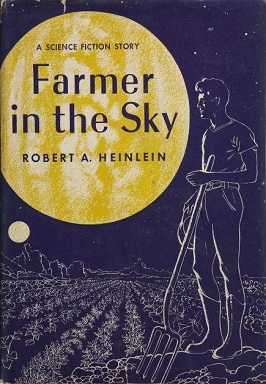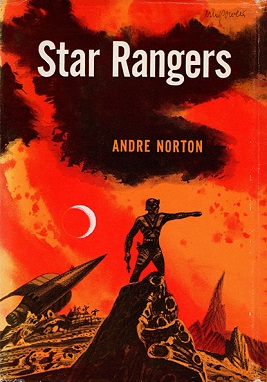
Farmer In The Sky is a 1950 science fiction novel by American writer Robert A. Heinlein about a teenaged boy who emigrates with his family to Jupiter's moon Ganymede, which is in the process of being terraformed. Among Heinlein's juveniles, a condensed version of the novel was published in serial form in Boys' Life magazine, under the title "Satellite Scout". The novel was awarded a Retro Hugo in 2001.

Scout Life is the monthly magazine of the Boy Scouts of America (BSA). Its target readers are boys and girls between the ages of 6 and 18. The magazine‘s headquarters are in Irving, Texas.

Law Enforcement Exploring, commonly referred to as Police Explorers or Police Scouts, is an American vocational education program that allows youth to explore a career in law enforcement by working with local law enforcement agencies. Founded on July 12, 1973, it is one of the Exploring programs from Learning for Life, a non-Scouting affiliate of the Boy Scouts of America. The program is generally available to qualified young adults who graduated 8th grade and are ages 14 through 21.
Arnold Drake was an American comic book writer and screenwriter best known for co-creating the DC Comics characters Deadman and the Doom Patrol, and the Marvel Comics characters the Guardians of the Galaxy, among others.

William Hillcourt, known within the Scouting movement as "Green Bar Bill", was an influential leader in the Boy Scouts of America (BSA) organization from 1927 to 1992. Hillcourt was a prolific writer and teacher in the areas of woodcraft, troop and patrol structure, and training; his written works include three editions of the BSA's official Boy Scout Handbook, with over 12.6 million copies printed, other Scouting-related books and numerous magazine articles. Hillcourt developed and promoted the American adaptation of the Wood Badge adult Scout leader training program.
The science fiction writer Robert A. Heinlein (1907–1988) was productive during a writing career that spanned the last 49 years of his life; the Robert A. Heinlein bibliography includes 32 novels, 59 short stories and 16 collections published during his life. Four films, two TV series, several episodes of a radio series, at least two songs and a board game derive more or less directly from his work. He wrote a screenplay for one of the films. Heinlein edited an anthology of other writers' science fiction short stories.

Since Scouting began in 1907, it has entered into many elements of popular culture, including movies, TV and books.
Judith Mary Berrisford (1921–2008) was a British writer of children's pony stories which are very similar to those of the Pullein-Thompson sisters, as well as other animal story and books on gardening.
Philip MacDonald was a British-born writer of fiction and screenplays, best known for thrillers.
The Heinlein juveniles are the science-fiction novels written by Robert A. Heinlein for Scribner's young-adult line. Each features "a young male protagonist entering the adult world of conflict, decisions, and responsibilities." Together, they tell a loosely connected story of space exploration. Scribner's published the first 12 between 1947 and 1958, but rejected the 13th, Starship Troopers. That one was instead published by Putnam. A 14th novel, Podkayne of Mars, is sometimes listed as a "Heinlein juvenile", although Heinlein himself did not consider it to be one.

Off the Main Sequence: The Other Science Fiction Stories of Robert A. Heinlein (ISBN 1-58288-184-7) is a collection of 27 short stories by American writer Robert A. Heinlein, including three that were never previously collected in book form.
"Nothing Ever Happens on the Moon" is a science fiction short story by American writer Robert A. Heinlein, published in April and May 1949 in Boys' Life, a magazine of the Boy Scouts of America, who jointly hold copyright with Heinlein, dated 1976. The story is about a boy who tries to become an Eagle Scout on the Moon. It is approximately 30 pages long as collected in Expanded Universe (1980). The story was again collected in Off the Main Sequence (2005).
Donald Keith was a pseudonym for authors Donald (1888–1972) and Keith Monroe (1915–2003). They are best known for their series of stories in the Time Machine series, which were originally published in Boys' Life magazine between 1959 and 1989. Some of the stories were combined into two books, Mutiny in the Time Machine (1963) and Time Machine to the Rescue (1967).

Walter "Pee-wee" Harris is a fictional Boy Scout who has appeared in several series of boy's books by Percy Keese Fitzhugh as well as in a long-running comic strip in the magazine Boys' Life. Originally spelled "Pee-wee", his name has occasionally been spelled "Pee-Wee" and is spelled "Pee Wee" in the Boys' Life comic strip.
Keith Monroe was an American author of children's science fiction and of books and magazine articles about Boy Scouting.

The Key Word and Other Mysteries is a collection of mystery short stories by American author Isaac Asimov, featuring his boy detective Larry. The book was illustrated by Rod Burke. It was first published in hardcover by Walker & Company in 1977, and in paperback by Avon Books in 1979. A British edition illustrated by Geoff Taylor and adding one additional story was issued by Pan Books in 1982.
Arthur Catherall (1906–1980) was an English author, mostly of works for children.

Star Rangers, also known as The Last Planet, is a science fiction novel by the American author Andre Norton. The novel was published on August 20, 1953, by Harcourt, Brace & Company. This is one of Norton's Central Control books, which lay out the history of a galactic empire through events suggested by Norton's understanding of Terran history.
Charles Stanley Strong was an American writer, adventurer and explorer.
Frederick Haydn Dimmock MBE was a British Scouting and science fiction magazine editor, writer of children's literature and supporter of the Boy Scouts Association.









